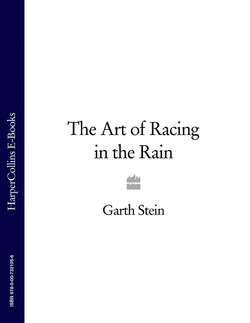Читать книгу The Art of Racing in the Rain - Garth Stein - Страница 9
Оглавление2
He picked me out of a pile of puppies, a tangled, rolling mass of paws and ears and tails, behind a barn in a smelly field near a town in eastern Washington called Spangle. I don’t remember much about where I came from, but I remember my mother, a heavy bitch of a lab with pendulous teats that swung to and fro as my littermates and I chased them down from across the yard. Honestly, our mother didn’t seem to like us much, and she was fairly indifferent to whether we ate or starved. She seemed relieved whenever one of us left. One fewer yipping mammal tracking her down to bleed her of her milk.
I never knew my father. The people on the farm told Denny that he was a shepherd-poodle mix, but I don’t believe it. I never saw a dog that looked like that on the farm, and while the lady was nice, the alpha man was a mean bastard who would look you in the eyes and lie even if telling the truth would serve him better. He expounded at length on the relative intelligence of dog breeds, and he firmly believed that shepherds and poodles were the smart ones, and therefore would be more desirable—and more valuable—when “bred back to a lab for temperament.” All a bunch of junk. Everyone knows that shepherds and poodles aren’t especially smart. They’re responders and reactors, not independent thinkers. Especially the blue-eyed sheep dogs from Down Under that people make such a fuss over when they catch a Frisbee. Sure, they’re clever and quick, but they don’t think outside the box; they’re all about convention.
I’m sure my father was a terrier. Because terriers are problem solvers. They’ll do what you tell them, but only if it happens to be in line with what they wanted to do anyway. There was a terrier like that on the farm. An Airedale. Big and brown-black and tough. No one messed with him. He didn’t stay with us in the gated field behind the house. He stayed in the barn down the hill by the creek where the men went to fix their tractors. But sometimes he would come up the hill, and when he did, everyone steered clear. Word in the field was he was a fighting dog the alpha man kept separate because he’d kill a dog for sniffing in his direction. He’d rip the fur from a nape because of a lazy glance. And when a bitch was in heat, he’d mount her good and go about his business without a thought about who was watching or who cared. I’ve often wondered if he sired me. I have his brown-black coloring and my coat is slightly wiry, and people frequently comment that I must be part terrier. I like to think I came from a determined gene pool.
I remember the heat on the day I left the farm. Every day was hot in Spangle, and I thought the world was just a hot place because I never knew what cold was about. I had never seen rain, didn’t know much about water. Water was the stuff in the buckets that the older dogs drank, and it was the stuff the alpha man sprayed out of the hose and into the faces of dogs who might want to pick a fight. But the day Denny arrived was exceptionally hot. My littermates and I were tussling around like we always did, and a hand reached into the pile and found my scruff and suddenly I was dangling high in the air.
“This one,” a man said.
It was my first glimpse of the rest of my life. He was slender, with long and lean muscles. Not a large man, but assertive. He had keen, icy blue eyes. His choppy hair and short, scruffy beard were dark and wiry, like an Irish terrier.
“The pick of the litter,” the lady said. She was nice; I always liked it when she cuddled us in her soft lap. “The sweetest. The best.”
“We were thinkin’ a keepin’ ’im,” the alpha man said, stepping up with his big boots caked with mud from the creek where he was patching a fence. That was the line he always used. Hell, I was a pup only a dozen weeks old, and I’d already heard that line a bunch of times. He used it to get more money.
“Will you let him go?”
“Fur a price,” the alpha man said, squinting at the sky, bleached a pale blue by the sun. “Fur a price.”
